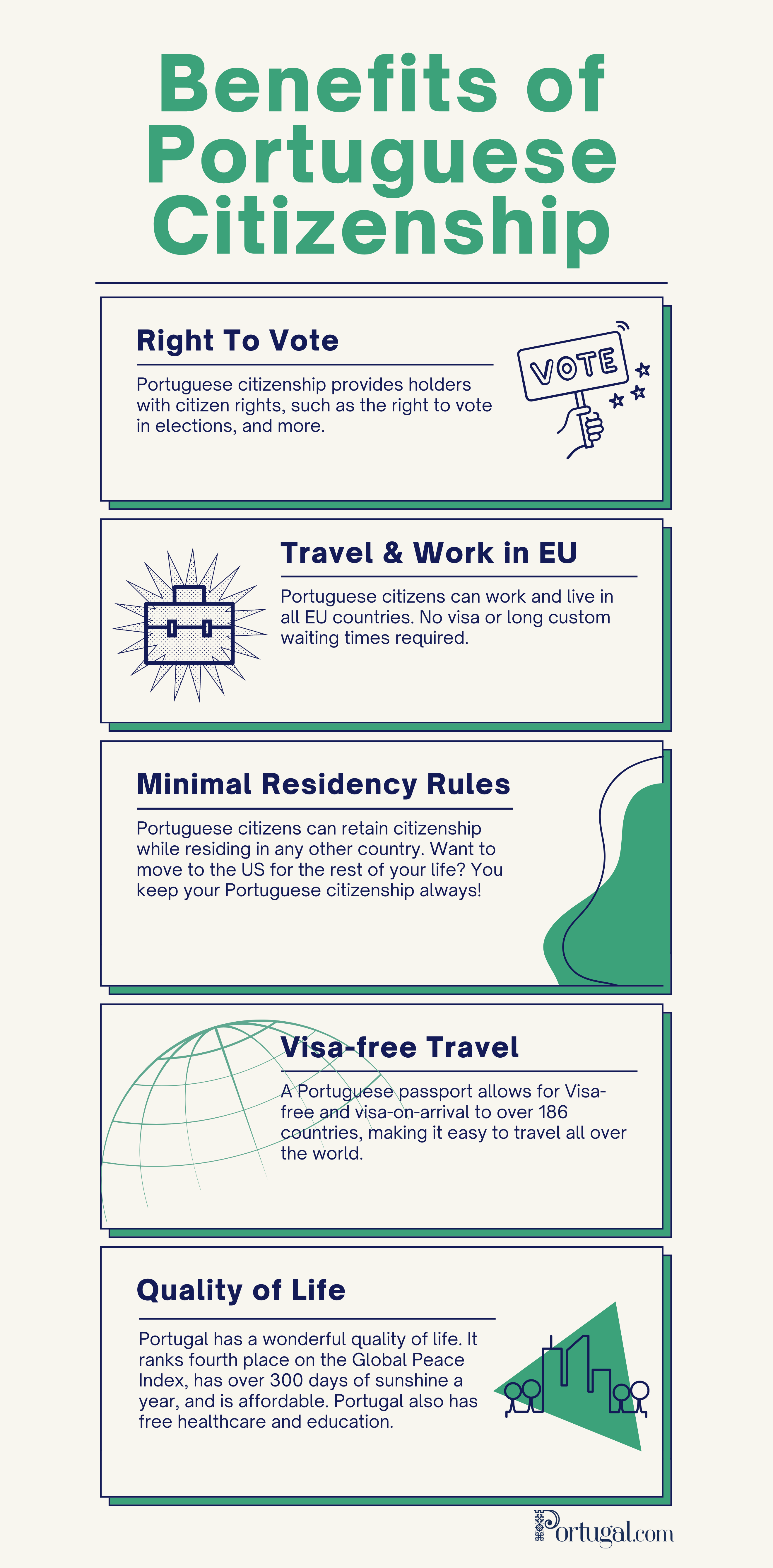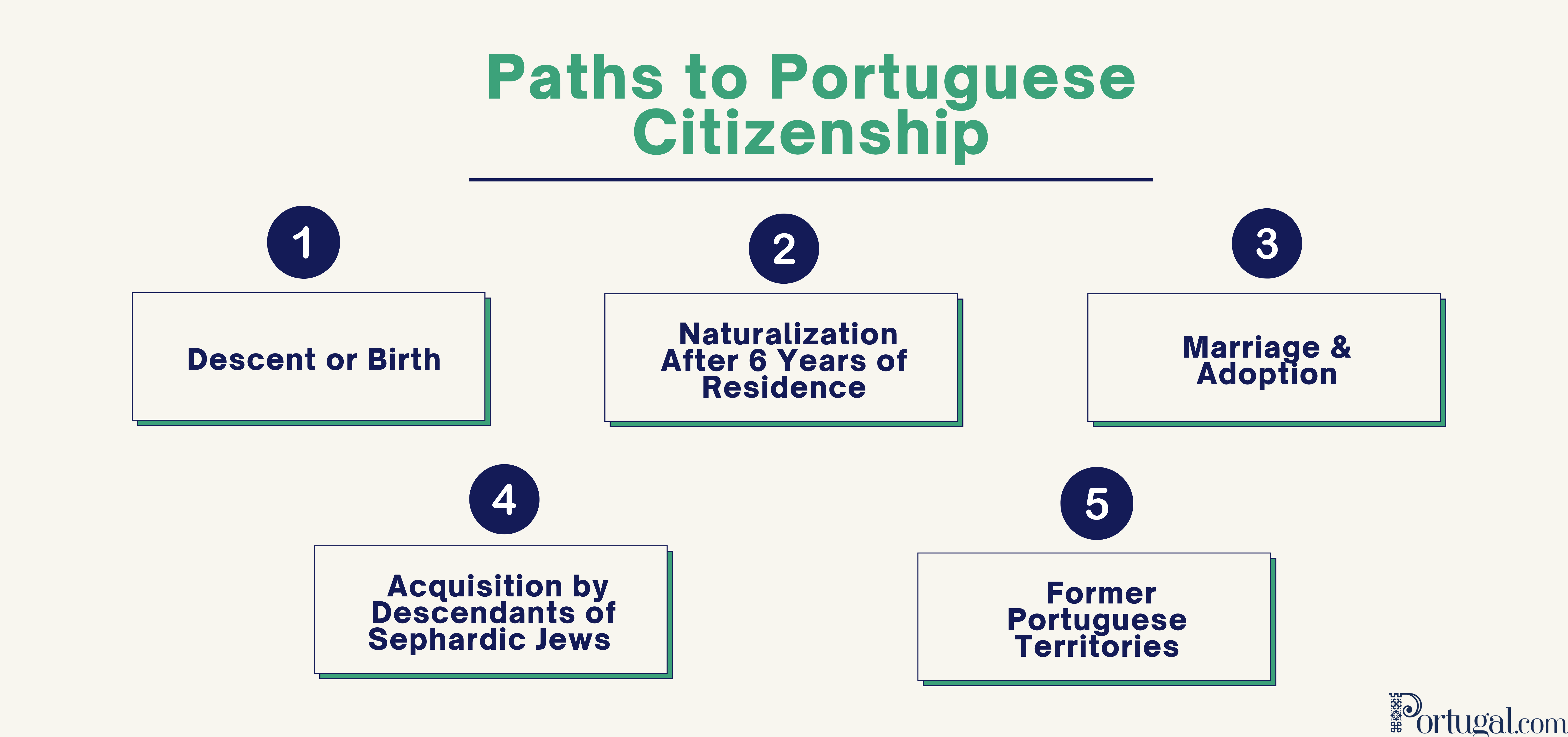Under the Passport Power Rank, Portugal ranks number 3 for being the most powerful passport, along with other countries such as Switzerland and Belgium. For many around the world, obtaining Portuguese citizenship is a privilege that allows passport holders the ability to travel and live freely across European Union countries. Portugal’s citizenship scheme is an attractive one, allowing for dual citizenship and having minimal residency requirements where citizens can live anywhere in the world without ever losing their citizenship. Portuguese citizenship also allows you the right to vote and hold the rights of any other Portuguese. If you are looking to obtain Portuguese citizenship, this guide has everything you need to know about becoming a citizen in Portugal.

How to Get Portuguese Citizenship

1. Descent or Birth
You can acquire Portuguese citizenship if you are a child:
- of a Portuguese parent born in a Portuguese territory
- of a Portuguese parent born abroad if the parent is there serving the Portuguese state
- of a Portuguese mother or father born abroad if their birth was registered at the Portuguese civil registry or alternatively if they declare they want to be Portuguese
- who was born in Portuguese territory to foreign parents if at least one parent was born in Portugal and resides in Portugal at the time of birth
- that was born in Portuguese territory to foreign parents if they declare they want to be Portuguese and if one parent has resided in Portugal for at least 5 years at the time of birth
- born in Portuguese territory that does not have another nationality
- born in Portuguese territory or abroad to a parent who got Portuguese nationality after the birth of the child
- with at least one grandparent of Portuguese nationality who is sufficiently familiar with the Portuguese language
- born in Portuguese territory to foreign parents if the child has lived in Portugal for 10 years
2. Naturalization After 6 Years of Residence
Those who have lived in Portugal for six years can apply for Portuguese citizenship if they pass a Portuguese language test and have not been convicted of a crime punishable in Portugal with a prison sentence of 3 years or more.
There are a few ways to obtain naturalization as a Portuguese citizen as a non-EU individual. As you will need to reside in Portugal for at least 6 years to be eligible for citizenship, you will need to apply for a visa. You can either obtain citizenship through an investment visa, the Portugal Golden Visa, or opt for the D7 or D2 Visa. However, if you are a member of the EU, you can legally reside in Portugal without a visa and obtain citizenship after 6 years.
Citizenship through Investment: Portugal Golden Visa
Created in 2012, the Portugal Golden Visa is known as one of the most attractive in the world. The Portugal Golden Visa was created to boost foreign investment to benefit the Portuguese economy. There are five types of investments you can make to qualify for a Portugal Golden Visa: a real estate acquisition, an investment fund, a capital transfer, job creation, or making a donation. Let’s take a look at the types of investments:
- Property Investment: Most people think you need to purchase property that costs at least €500,000 in Portugal to get a Golden Visa. However, you can spend less. If you purchase real estate in a low-density area in Portugal, the minimum to spend is €400,000. You can also buy real estate that is over 30 years old in an urban rehabilitation area and renovate it for at least €350,000. However, since January 2022, you cannot purchase real estate in Lisbon, Porto, and coastal towns. Only properties in Azores and Madeira, as well as interior territories, are now eligible for the Portuguese Golden Visa as these are low-density areas.
- Investment Fund: Spend a minimum of €500,000 subscription in a qualifying Portuguese investment fund. In Portugal, these are known as fundos de capital de risco and are investment funds that support Portuguese businesses.
- Capital Transfer: The most expensive option to qualify for a Portugal Golden Visa is making a capital transfer of a minimum of €1.5 million to Portugal. You must have proof of bank transfer deposits to Portugal from an international account that adds up to at least this amount.
- Job Creation: There are two main investment options in this category. The first option is to create a minimum of ten new full-time jobs in a Portuguese business that you own. You do not need to invest a certain amount here. The second option has two requirements. First, you invest a minimum of €500,000 in an existing Portuguese business. Second, that business must create a minimum of five new full-time jobs within three years.
- Donation: You can either invest a minimum of €250,000 in preserving national heritage or €500,000 in a research and development activity in Portugal.
Guide to the Portugal Golden Visa
Citizenship through D7 Visa
Also known as the Retirement or Passive Income Visa, the D7 Visa is a long-term residency visa that was introduced in 2007 and unlike the Portugal Golden Visa requires no investment. Along with retirees, this visa is suitable for some remote workers and digital nomads. This visa is for non-EU/EEA/Swiss citizens who want residence in Portugal and have a reasonable passive income. This income can be from a retirement pension, as well as a financial investment, real estate, and salary.
The minimum passive income required is €8,460 per year for the main applicant. For a spouse, you must add 50% to this (€4,230) and for a dependent child, you must add 30% to this (€2,538). Therefore, for a couple with one child, you would need around €15,300 a year to be eligible for the D7 Visa.
There are other requirements including a clean criminal record, proof of residence address in Portugal (rental or purchase), and you must spend at least 16 months in Portugal during the first 2 years of your residence.
Citizenship through D2 Visa
The Portugal D2 Visa allows entrepreneurs, freelancers, and independent service providers to reside in Portugal. This visa only applies to non-EU/EEA/Swiss citizens who wish to start a business or relocate their existing business to Portugal. You can also choose to invest in an existing business in Portugal.
To be eligible, you must show that you either have set up a company operating in Portuguese territory or that you have the financial resources in Portugal that demonstrate you can set up a company in Portugal. You can obtain these financial resources through a proof of loan from a Portuguese bank. There is no official amount that you need, but the recommended amount is at least €5,000. You will also need to show that you have enough money to sustain yourself. For yourself as the main applicant, you must have 100% of the minimum salary which is €8,460 per year. For a spouse, you must add 50% to this (€4,230) and for a dependent child, you must add 30% to this (€2,538). Therefore, for a couple with one child, you would need around €15,300 a year to be eligible for the D2 visa.
3. Marriage & Adoption
After three years of marriage or cohabitation with a Portuguese citizen, you can acquire Portuguese citizenship without having to reside in Portugal. Your citizenship will not be revoked if you get divorced. If you are not married but have lived with your partner for more than two years and can prove so, you are also eligible as your relationship is considered a de facto union.
However, you cannot obtain Portuguese citizenship if you are serving another country on non-mandatory military service or if you exercise any non-strictly technical public position in another country.
Moreover, if you adopt a child from abroad that is under the age of 18 they can apply for citizenship immediately.
4. Acquisition by Descendants of Sephardic Jews
Under the Jewish Law of Return, the Portuguese government grants Portuguese citizenship through naturalization to the descendants of Portuguese Sephardic Jews who were expelled from Portugal during the Portuguese Inquisition. By January 2022, there were over 50,000 cases granted, with around 80,000 pending. Russian billionaire Roman Abramovich got Portuguese citizenship through this law.
5. Former Portuguese Territories
Citizens of former Portuguese colonies who were born during the period of Portuguese rule are entitled to Portuguese citizenship. This includes Angola, Cape Verde, Portuguese India, Guinea Bissau, East Timor, Macao, Mozambique, and Sao Tome and Principe. Citizens from Portuguese India and Macao who descend from those under the period of Portuguese colonialism are also eligible for citizenship.
Applying for Portuguese Citizenship
You can apply for Portuguese citizenship in a Portuguese consulate in your country of residence or in Portugal in the following places:
- The desk at the Institute of Registries and Notaries at the National Center for Support to the Integration of Migrants (CNAIM) in Lisbon and Porto.
- In Lisbon Registration Spaces.
- In the Citizen Shop of Odivelas.
- In the Civil Registry.
The documents necessary will depend on your path to citizenship and will differ if you choose to go the visa route. However, these are the documents necessary for Portuguese citizenship through naturalization:
- Passport
- Birth certificate
- Proof of knowledge of Portuguese language (A2 level)
- Details of residence permit
- Date and place of birth, occupation, current residence, and list of countries you have resided in
- Criminal record certificate
- Document issued by SEF proving legal residence for at least 6 years
Frequently Asked Questions (FAQs) About Portuguese Citizenship
Can you buy Portuguese citizenship?
Non-EU/EEA/Swiss nationals can technically purchase Portuguese citizenship through the Portugal Golden Visa. This visa allows you to make an investment in Portugal and be eligible for citizenship after six years of residence. There are five types of investments you can make to qualify for a Portugal Golden Visa: a real estate acquisition, an investment fund, a capital transfer, job creation, or making a donation. Take a look at our guide to the Portugal Golden Visa.
How long does it take to get Portuguese citizenship?
Citizenship is available after six years of residence or three years if you are claiming citizenship by marriage.
Is dual citizenship allowed in Portugal?
Portugal allows dual citizenship so Portuguese citizens that acquire foreign citizenship do not lose their Portuguese citizenship and vice versa.
How much does it cost to apply for citizenship in Portugal?
The costs of citizenship through naturalization are around €175 to €200.



Hello,
My wife and I would like to obtain citizenship through D7 Visa.
I am a retired doctor and have the passive income required above.
Please let me know what I have to do?
Hi Joseph,
You should contact an immigration lawyer to help you apply.
The cheapest Golden Visa option is actually the Cultural Production Golden Visa track – but situated in low-density areas (as per NUTS III definition). There it’s EUR200K – and if you invest in an eligible pre-sold film production project, it’s not a donation.
I am American. My stepmother is Portuguese and married my father in 1972. I then lived with them (father gained legal custody) from the age of 8 in 1976, untill 1986 when I graduated from high school at the age of 18. We lived in New Zealand, Australia, and then the United States due to my father’s work. I have a Contribuent number and bank account in Portugal, and travel there every summer to visit my Mom. She is getting elderly and I wish to have freedom to come and go between the U.S. and Portugal. Is it possible to seek citizenship since she is my patent, even though she is technically my step-parent? I would appreciate your response as to how to proceed. I read that the D7 visa has a stipulation of 183 consecutive days stay in Portugal and since I have an adult child, daughter-in-law and grandchildren, things come up that may pull me temporarily from my intended stay in Portugal. I could potentially work in Portugal as an English teacher (my current profession). I would welcome and appreciate your input as to how to best proceed.
Hi Pamela! Unfortunately, you wouldn’t be able to get citizenship by descent. The only visa that does not require one to stay in the country for extended periods is the golden visa. However, due to your particular case, I would definitely recommend having a chat with an immigration lawyer that will have more information.
My father was born in Portugal and migrated to Panama, where I was born. I’m looking to getting my Portuguese citizenship. Would you recommend to travel to Portugal as a tourist, and apply for the citizenship there?
The Portugal embassy in Panama has a very long process and I need it asap, so I can stay in Portugal for health reasons.
Your comments are appreciated,
Fatima
Hi Fatima,
I recommend contacting an immigration lawyer in Portugal to assess your situation. Beware of overstaying a tourist visa, as you could not only be deported but also be banned from entering the Schengen zone for a period of time.
Hi both my parents were born in Portugal but immigrated to the us where I was born. I speak fluent Portuguese but can only read and write a little. I would like to get dual citizenship, can I do this at my local consulate and will my birth certificate showing both parents place of birth be sufficient or do I need something from my parents?
Hi Martha,
I recommend calling the local consulate and asking what documents you will need.
I have Portugal citizenship and my wife does also. I have 2 step-children and would like them to become Portugal citizens. What is the process?
Hi Kris,
The first step would be to contact your local embassy, but I recommend contacting an immigration lawyer as well.
I’m thinking of getting my birth certificate (translated and apostilled) now since I happen to visit my home country, but I still have about a year and a half till I can apply for the citizenship. Will that still be valid and accepted? Thank you.
My husband was born in Portugal and has citizenship in both Portugal and the U.S. We have been married for 16 years out of the 23 years we have been together. I voluntarily served in the U.S. Army National Guard from August of 1990 to March of 1999 as a Radiographer (X-Ray Technologist) and Medic. I have been discharged from service for over 24 years and worked in local hospitals. I am now 58 and we are both retired. Can I apply for Portuguese Citizenship?
Hi Michele! I recommend contacting an immigration lawyer to look at your case but citizenship through marriage is possible.
Hi Lara! Quick question, we’re looking to apply for my husbands citizenship through marriage. He served in the military in 2009-2010. Will this implicate his application at all? I’ve read on the Portuguese justiça website that this is an issue?
Hi Jessica, I recommend contacting an immigration lawyer to answer your question adequately.
Hi Lara, I also have a question about the Citizenship through marriage. I served in the military, wife and children are all dual citizens .I would like to apply for dual citizenship wondering if anyone above got answers from a lawyer if there service would disqualify them for citizenship or if there is a way to process and be approved?
I was born in Portugal in 1946, became an American citizen in 1968. Both my parents were born in Portugal. Can I hold dual citizenship? How do I go about getting citizenship in Portugal along with my American citizenship?
Hi Maria, in theory yes! I would recommend contacting an immigration lawyer.
Hello,
I would like to know if I can qualify for Dual citizenship, I am an American citizen, my partner and I have been together for 9 years (co habituating) we have purchased a home in Portugal 4 years ago. He is Portuguese born and a Portuguese citizen. I am interested in a dual citizenship can this be possible we are both in our 50’s.
Hi Iliana, Portugal allows you to hold dual citizenship, so if you get Portuguese citizenship, you can also keep your US passport. In short, it is possible for you to do this.
My mother’s parents were both born in Portugal, however she was born in the United States.
Am I able to apply for Portuguese citizenship ?
If so, is a citizenship attorney recommended ?
Hi Charles, if at least one of your grandparents did not lose/give up their Portuguese citizenship, then you would be eligible for Portuguese citizenship if you can prove your ties to them with required documents. We recommend a citizenship attorney.